 http://www.esvbible.org/Judges+12/
http://www.esvbible.org/Judges+12/
http://www.esvbible.org/Acts+16/
http://www.esvbible.org/Jeremiah+25/
http://www.esvbible.org/Mark+11/
THREE OBSERVATIONS ON THESE STEPS in the ministry of Paul and Silas (Acts 16):
(1) To understand Paul's "Macedonian call" (Acts 16:6-10), one must follow his movements on a map. After traveling through the central part of what is now Turkey, the Spirit forbids Paul and Silas from going into Asia (Acts 16:6), i.e., Asia Minor, the Western part of modern Turkey. So they travel north. Now they try to enter Bithynia (Acts 16:7). Had they been enabled to do so, they would have been on the major east/west road that joined the Roman Empire with India — and heading east. But the "Spirit of Jesus" forbids them from taking that step (Acts 16:7), and so they go in the only direction still open to them along the roads of the day: they head toward the port city of Troas. From there, there is only one obvious place to go: across the water to Europe.
During the night Paul has a vision of a man in Macedonia, the nearest landfall of Europe, begging him, "Come over to Macedonia and help us" (Acts 16:9). This confirms Paul and Silas in their movements; it does not redirect them. The result is ministry on the continent of Europe, and ultimately a path to Rome.
(2) Paul's first convert in Europe was a woman, an intercontinental business traveler from Thyatira. Note the description of her conversion, and then the description of the Philippian jailer's: "The Lord opened her heart to respond to Paul's message" (Acts 16:14); "The jailer....had come to believe in God — he and his whole family" (Acts 16:34). Let's use both locutions today.
(3) Worth pondering are the occasions when Paul stands on his Roman citizenship, and when he does not. Sometimes he is beaten without a word of protest. In Philippi, Paul and Silas are "severely flogged" (Acts 16:23-24), apparently without protesting. Roman citizens were exempt from flogging until they had been found guilty of the crime for which they were charged. Yet when the jailer is told to release the prisoners, Paul protests that he and Silas, both citizens, have been flogged without a trial, and insists that the city's leaders come and escort them out of jail as a kind of public apology (Acts 16:37-39). Why not simply suffer in silence, not least since that is what they sometimes do?
It is difficult to prove, but many have argued, believably, that Paul stands on his rights when by doing so he thinks he can establish legal precedents that may help other Christians. Every case on the books where Christians have been shown not to be guilty of public disorder or a threat to the Roman Empire can only be a useful legal precedent. If this is right, it is a mark of strategic thinking — for the sake of others.
Judges 12; Acts 16; Jeremiah 25; Mark 11















